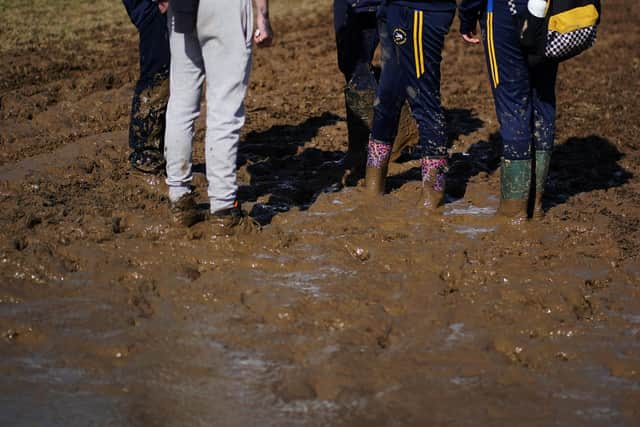JONNY MCCAMBRIDGE COLUMN: Days out at the ploughing match – how I learnt that tractors were never going to make it at the Olympics
and live on Freeview channel 276
Looking on from afar, what was most notable for someone who has never been (and is unlikely ever to go), was the sheer size and scale of the affair. It was estimated in advance that close to 300,000 people would attend the annual agricultural event in Ratheniska (including many from Northern Ireland), although poor weather seemed to diminish the final total.
By comparison, around 200,000 go to the Glastonbury festival every year. Another thing the gathering seems to have in common with the famed music event is the need for a sturdy pair of wellingtons when the rain comes. I had some friends who attended (the ploughing, not Glastonbury) and sent me photographs of the car park which a combination of wet weather and tyres had transformed into…well, into a ploughed field.
Advertisement
Hide AdAdvertisement
Hide AdI read several times that the National Ploughing Championships is one of Europe’s largest outdoor events. The site contains 180 acres for ploughing, 400 acres of car parking and a 25 acre demonstration area. It seems that the ploughing is big business.


Growing up in north Antrim, the local annual ploughing match was always eagerly anticipated in our house. My da had then and retains today a complete fascination with tractors. As I recollect, the match always seemed to take place on New Year’s Day, presumably with the intention of starting the year with a high that would set the scene for the forthcoming months.
When I was a boy, my da’s contagious sense of anticipation often infected me. I was pretty much obsessed by all competitive games. The use of the word ‘match’ in the title drew me in. What exactly would a ploughing match entail? I was very young and the prospects ran wild through my mind.
I had visions of tractors hurtling towards a distant finishing line, sending up streams of muck in their wake as they raced to be first through the tape. Maybe there would be obstacles in the field that the tractors would have to navigate, hidden deep pits filled with snakes in the soil, ramps which would enable them to jump over stationary cars and a flaming ring which they would have to crash through.
Advertisement
Hide AdAdvertisement
Hide AdFailing that, perhaps the tractors would engage in some sort of battle which involved physical contact inside a roped arena as the gleaming, razor-sharp blades of the ploughshare mercilessly cut each other to ribbons.
Better still, the ploughing match could be a modern-day equivalent of the ancient sport of jousting. The two great mechanical beasts would face off at opposite ends of the field, black smoke belching angrily and menacingly from their proud vertical exhausts.
A handkerchief would be dropped on the ground and the tractors would set off, gathering pace as they neared each other and then causing a great explosion of sparks as the ploughs clashed and a victor was declared.
Reality was however, soon to come crashing in around me, and it was much more mundane. After parking the car, we’d hike across the hard and frosty January ground towards the fields where the contest took place.
Advertisement
Hide AdAdvertisement
Hide AdThere I observed tractors slowly, so so slowly, inching up and down the ground in straight lines, leaving trails of freshly dug earth behind them. I watched for a few minutes before I became quickly bored.
I was also confused. I could not detect the element of competition that the term ‘match’ suggested. I asked my da how it worked and he patiently explained that they were judged on the straightness and neatness of the furrows. I studied the furrows, they all looked much the same to me.
There just seemed to be a lack of drama to it all, a paucity of competitive edge, no obvious and clear way of determining who were the winners and losers. None of the competitors emerged from their cabs and celebrated in the fashion of a football player scoring a goal. There were no tears of commiseration from the vanquished.
They just kept driving their tractors slowly up and down the field. It seemed to fall far short in my view of being something which could be considered for inclusion as an Olympic sport.
Advertisement
Hide AdAdvertisement
Hide AdEven for the spectators, the main draw seemed to be social, rather than a thirst for competitive action. Lots of old men in flat caps would spend hours chatting conspiratorially to each other, displaying no obvious attention towards the ploughing at all.
A photographer from the local paper always turned up. I think I featured in the publication one year looking suitably miserable standing in a frozen field at the ploughing match. My warmest memories of it all are the intoxicating smell of the burger van and my da’s agreement that I could have a bag of chips, probably bought to stop me whining for a bit about wanting to go home.
I haven’t really thought much about the ploughing matches in about four decades, but the reports from Co Laois last week squeezed out some of the memories from a dusty old room somewhere inside my brain. Looking back now I suppose the intention in bringing me to the events was an expectation that some of the interest that my family had in agriculture, in tractors and ploughs, would be passed down through the generations. But it just never seemed to work out that way. I didn’t grasp it then and I still don’t.
But I have more empathy now as a father myself. Despite all my best efforts to interest my son in the things I like, he remains indifferent to them and stubbornly and correctly determined to follow his own path.
I suppose we all have to plough our own furrows in life.